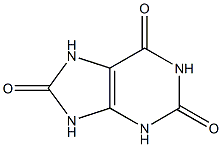Description
Uric acid (urate) is the end product of human purine metabolism and is mainly excreted in urine. Many factors, including genetic components and acquired factors, such as obesity and alcohol consumption, influence serum uric acid concentrations. Hyperuricemia induces or facilitates gout, kidney stones, metabolic syndrome, hypertension, and renal and cardiovascular disease, while exercise-
induced acute renal failure is a significant complication of renal hypouricemia. Cayman’s Uric Acid Assay provides a fluorescence-
based method for detecting uric acid in serum, plasma, and urine.
General Description
In humans and primates, uric acid is the end product of purine metabolism. It is produced by the oxidation of xanthine and hypoxanthine by xanthine oxidase and excreted in urine. High serum levels of uric acid, hyperuricemia, are associated with insulin resistance, cardiovascular disease, and gout. The mechanisms leading to hyperuricemia are typically either increased uric acid production or decreased urine excretion. Increased serum uric acid may be a marker of renal disease.

